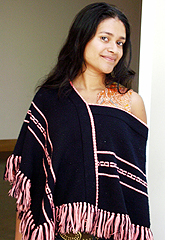|
 Nandini
Chattopadhyay, who received her B.A. in anthropology from SFSU in May,
is one of only fifteen 2004 graduates throughout the United States
selected as the first recipients of a Merage Institute Fellowship.
The $10,000
award, dedicated to "inspire new Americans to greater achievement," was
established by Paul and Lilly Merage, immigrants themselves, who achieved
their "American Dream." Nandini
Chattopadhyay, who received her B.A. in anthropology from SFSU in May,
is one of only fifteen 2004 graduates throughout the United States
selected as the first recipients of a Merage Institute Fellowship.
The $10,000
award, dedicated to "inspire new Americans to greater achievement," was
established by Paul and Lilly Merage, immigrants themselves, who achieved
their "American Dream."
The fellowship
is the first-ever scholastic award for Chattopadhyay, the 24-year-old
daughter of a software developer who was born in India but lived in
Singapore and Montreal before immigrating to the
U.S. almost five years ago.
"I suppose I've been an anthropologist my whole life," Chattopadhyay
says. "Every time my family moved to a new country, I not only had
to learn another language, I had to figure out the culture." Though
her mother language is Bengali, she was schooled in English and speaks
Hindi, Spanish and French. It is Portuguese, however, that figures most
prominently in Chattopadhyay's future.
"Right
now I know only a few words," Chattopadhyay readily
admits. "The word 'samba' means 'rubbing bellies together.'" An
amusing bit of trivia to most people, it is a solid starting point for
Chattopadhyay. Samba originated in the "Favelas" the shanty-like
towns occupied by the Afro-Brazilian people who came to Brazil as slaves
in the mid-19th century. The Merage funding will allow Chattopadhyay
to study the music and dance traditions of this disenfranchised community
in the town of Salvador in Bahia, Brazil.
Chattopadhyay
embraced the Afro-Brazilian beat when she took a Brazilian dance class
in San
Francisco. A dancer who has studied many traditions,
Chattopadhyay has a passion for studying the "role of music and
dance as a tool for empowerment." One of her first self-directed
field studies was the music of the Bauls, a rejected caste in India.
Chattopadhyay
plans to involve the Afro-Brazilians in Salvador in a theater/dance/music
installation in their home town. Having visited the
Favelas of Salvador previously she says she was inspired by how community
members expressed themselves through their music and dance. While her
own perspective on the culture may be evident in the piece, Chattopadhyay
says she is determined to present it "through their eyes."
One of the ways she plans to approach the project is to give disposable
cameras to everyone in the community, hoping that the resulting photographs
portray what is important and meaningful to the participants. Adding
the sound of Afro-Brazilian music to a display of the photos Chattopadhyay
hopes will demonstrate the long standing traditions of this culture while
showing the impact of the arts on individual lives. After a year in Bahia,
Nandini hopes that her installation will remain permanent so that visitors
to the region will share her discovery of the value and beauty in the
Afro-Brazilian culture.
Chattopadhyay plans to apply a portion of the Merage funding to her
master's degree studies. Her "American dream" is to pursue
a Ph.D. in socio-cultural anthropology and continue to use it as a
tool to empower others through their own culture and arts.
Beverly Voloshin, professor of English and faculty coordinator of academic
honors and scholarships, received several excellent applications for
Merage fellowships from SFSU students. She eventually submitted only
three nominations. Chattopadhyay stood out throughout the process for
her self-directed fieldwork among the Bauls and her ideas about the cultural
distinctions and commonalities in the area of music and dance between
cultures, said Voloshin.
"Although this was only the first year for applications to the
Merage Fellowships," says Voloshin, "it was very competitive."
Students from Harvard/MIT, Princeton, Stanford, University of Miami,
University of Chicago, University of Washington, Hunter College and the
University of California campuses at Berkeley, Irvine and Los Angeles
also received awards.
-- Denize
Springer
 |
